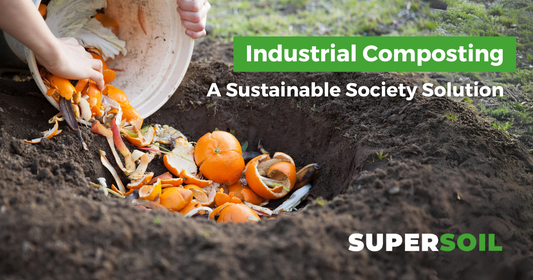Transform Your Compost

CASE STUDY - CATHI, AUSTRALIA
Based in Australia, Cathi’s was struggling to cope with the slow decomposition of organic matter in her compost heap, which led to a lack of nutrient-rich compost available for her gardening.
Determined to find a solution, Cathi turned to Supersoil as a compost accelerator, and the results she witnessed were astonishing. The once slow-decomposing pile transformed rapidly, thanks to Supersoil's potent formula.
She couldn’t believe the end outcome where Supersoil created a magnificent dark humus brimming with nutrients and teeming with beneficial microbes. This exceptional end product empowered Cathi to nurture her plants to vibrant health and beauty.

CASE STUDY - PEGGY, FLORIDA
Based in sunny Florida, Peggy was becoming more and more frustrated with how difficult it was to cultivate the finest compost to nourish her garden and plants.
When Peggy decided to incorporate Supersoil as her compost accelerator, she couldn’t believe the thriving population of worms that emerged in her compost mere weeks after its application.
Worms play a crucial role in composting by breaking down organic matter, aerating the compost pile, and enriching it with valuable nutrients. Their presence indicates a healthy and thriving compost ecosystem, leading to faster decomposition and the production of nutrient-rich compost which was ideal for nourishing plants in Peggy’s garden.

CASE STUDY - SCOTT, IRELAND
Scott, a seasoned gardener from Ireland, had long been grappling with the slow decomposition of his compost. Despite his extensive experience with various composting techniques, it typically took him an entire year to break down the organic materials in his compost bay. His composting process included a mix of biochar, volcanic rock dust, leaves, straw, vegetable scraps, grass clippings, and cardboard. Frustrated by the lengthy decomposition time, Scott sought a more efficient solution to accelerate this process.
In January, Scott decided to experiment with Supersoil, a product he had heard could enhance composting efficiency. He applied Supersoil to his compost bay, which consisted of his usual organic materials. Supersoil is designed to stimulate microbial activity and expedite the breakdown of organic matter. Scott hoped that this product could significantly reduce the time required to produce rich, usable compost.
By May, just five months after starting his experiment with Supersoil, Scott was astonished by the results. The decomposition process, which previously took a year, was now completed in less than half that time. The use of Supersoil had triggered an explosion of bacterial activity within his compost bay, dramatically accelerating the breakdown of organic matter. This remarkable improvement not only saved Scott time but also provided him with high-quality compost much faster than he ever anticipated. The efficiency of Supersoil transformed his composting routine, showcasing its effectiveness in enhancing microbial activity and speeding up compost production.

Super Simple Process

Step 1 - Proof

Step 2 - Partner

Step 3 - Progress
Frequently Asked Questions
-
How Does Compost Accelerator Work?
The activator agent in any compost accelerator contains large amounts of bacteria and fungi to help the compost tolerate high and low temperatures. The addition of nitrogen then provides the necessary heat to accelerate compost processing.
But the more nitrogen your activator agent contains, the less essential organisms can contribute. So the compost accelerator must strike a perfect balance between the amount of nitrogen and carbon for these essential organisms and microbes to exist.
-
What are the Benefits of Compost Accelerator?
Compost accelerators reduce compost processing time and odor, and increase the availability of nutrient-rich humus for soil improvement. A compost booster also helps maintain the correct moisture balance, optimizes nutrient availability for plant growth, and improves overall soil quality. Supersoil’s organic fertiliser provides a high quality compost accelerator that is completely sustainable, allowing faster composting and soil improvement for more efficient and cost effective farm management.

